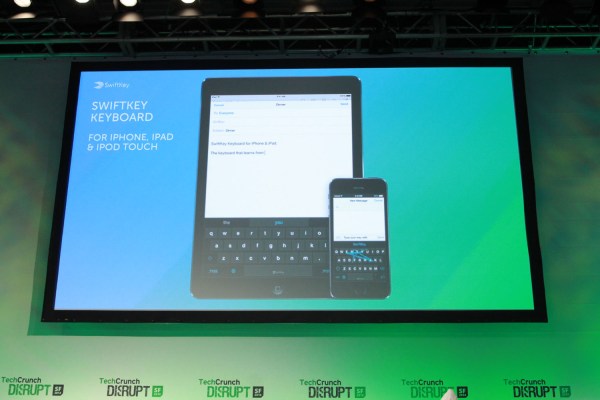SwiftKey, the predictive keyboard startup that was embedded on more than 100 million Android devices last year, and more than 200 million cumulatively, has demoed its software working on iOS 8 for the first time here at TechCrunch Disrupt SF.
SwiftKey’s machine learning software learns its users’ syntax, slang and social language usage to offer intelligent next word predictions within the context of the missive being created to help speed up the touchscreen typing process. It’s a keyboard customized and contextualized to what you tend to type.
The UK startup, which was founded in 2008 when the iPhone’s native keyboard was definitively closed to alternative keyboard software, built a business on the open Android platform. But with Apple opening a door in its walled garden to third party keyboards, SwiftKey now has a shot at scaling its business on a whole new platform — a platform where it could only dabble before.
[gallery ids="1056670,1056669,1056668,1056667,1056666,1056665,1056664,1056663,1056662"]
The latest iteration of Apple’s mobile software, iOS 8, opened up the platform to third party system wide keyboards, paving the way for the SwiftKey software Disrupt attendees saw demoed by CMO Joe Braidwood. Pricing has not yet been announced for the app which will be released on September 17, in line with the launch of iOS 8.
Of course SwiftKey also faces a rush of keyboard rivals scrambling to roll out their own wares on a shiny new iOS plot. And indeed from Apple itself, which added its machine learning predictive keyboard feature in iOS 8, called QuickType. But the veteran keyboard maker, which is backed by VCs including Index and Accel, will be hoping the brand visibility and engaged user-base it has built on Android can translate into a sizeable chunk of users on iOS.
It also recently dropped its paid for business model, switching to a freemium app model to wrong-foot the competition, with a plan to monetize its keyboard software via in-app purchases focused on user customization, such as keyboard themes. It remains to be seen whether SwiftKey plans to charge for its app on iOS or follow the same freemium model.
The first version of SwiftKey on iOS will be available for iPhone, iPod Touch and iPad, although its finger-dragging flow interface — which competes with the Swype keyboard software — is only initially available on the first two iOS device types.
“We’re not yet on the Apple Watch but maybe we’ll get there one day,” quipped Braidwood.
The iOS app supports SwiftKey Cloud, which backs up a user’s language-use profile so it can be synced across multiple devices.
It also supports dual language input — in languages including English, Spanish, French and Portuguese — which lets users type in two languages simultaneously without the need to switch between dedicated language keyboard.
The company has put together a launch video, narrated by British actor and comedian Stephen Fry, embedded below.
